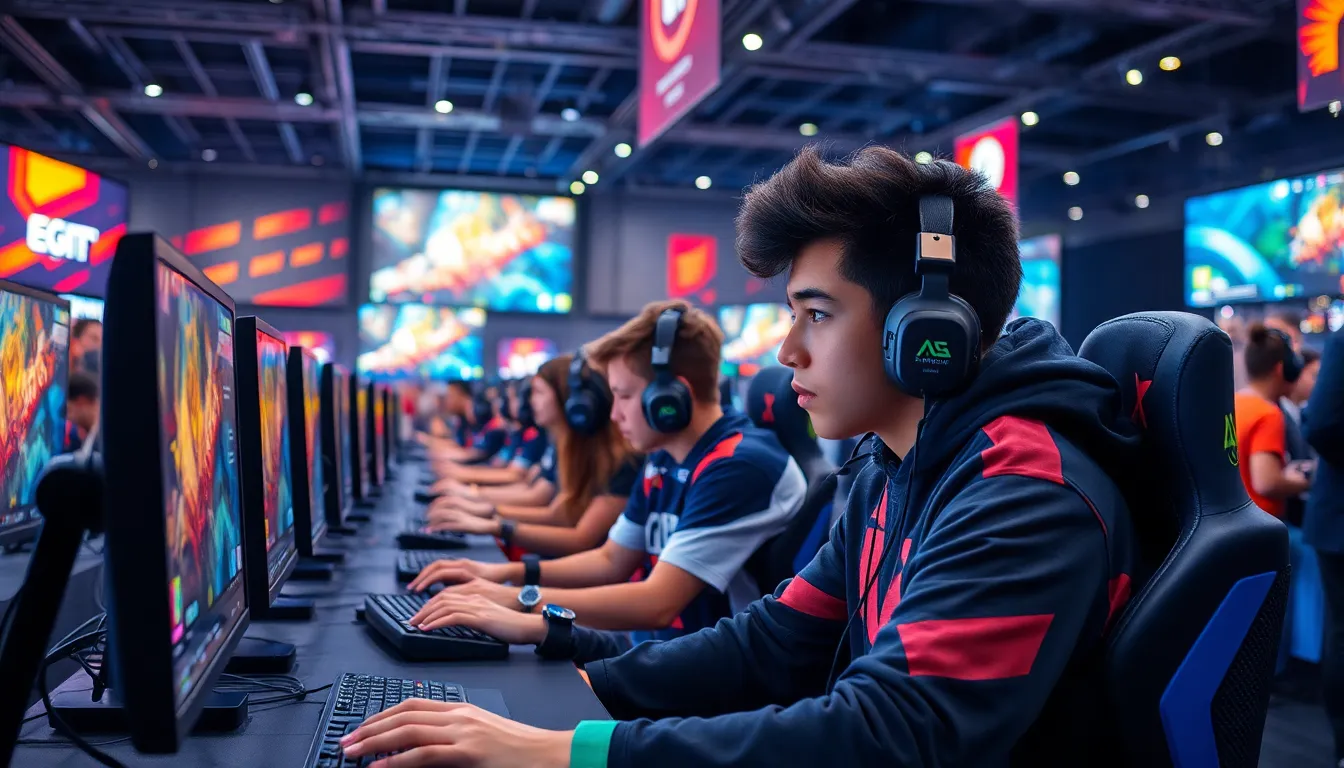In a world where athletes can score a winning goal or a critical headshot, the debate between esports and traditional sports heats up. Picture this: one group of athletes sweats it out on the field, while another hones their skills in a virtual arena, all while munching on energy drinks and snacks. It’s a showdown that’s got everyone asking—can gaming really be considered a sport?
Table of Contents
ToggleOverview of Esports and Sports
Esports encompasses competitive video gaming where players or teams face off in virtual environments. Players often compete in popular games like League of Legends, Dota 2, and Fortnite. Audiences gather in large numbers, filling stadiums or tuning in online, demonstrating the growing popularity of this competition format.
Traditional sports, such as football, basketball, and soccer, involve physical activity and often require extensive training and teamwork. Athletes typically engage in rigorous practice schedules and participate in various tournaments and leagues. The cultural significance of traditional sports is evident, with long-standing traditions, fan bases, and organizational structures.
Both esports and traditional sports demand strategic thinking and quick reflexes. Players in esports coordinate complex moves with precision, while athletes in traditional sports rely on agility and physical endurance. Recognition from mainstream media and sponsors continues to expand for both sectors, though traditional sports maintain a dominant presence historically.
The competitive nature of both arenas drives innovation in training methods and performance analysis. Esports utilizes technology and data analytics to improve gameplay, while traditional sports increasingly apply advanced metrics to enhance athlete performance. Both realms influence each other, with crossover in fan engagement and sponsorship opportunities.
Esports has emerged as a valid competitive force alongside traditional sports, drawing in diverse audiences and reshaping perceptions of competition. Recognition of their respective values continues to evolve, planting both firmly in the landscape of modern entertainment.
Key Differences Between Esports and Sports

Esports and traditional sports differ significantly in various aspects. Understanding these differences helps clarify their unique characteristics.
Competition Structure
Esports feature online and offline tournaments where players or teams compete for rankings and prizes. Organized leagues like the Overwatch League highlight structured competition. In contrast, traditional sports rely on established seasons governed by leagues such as the NFL or NBA. Teams train extensively to prepare for games, balancing strategy and skill. While both formats attract dedicated fans, esports often thrive on rapid match formats and game rotations, leading to fast-paced gaming events that differ from lengthy sports seasons.
Audience Engagement
Audience engagement varies markedly between esports and traditional sports. Live streams on platforms like Twitch and YouTube allow fans to view matches in real time, immersing them in the action. Esports cater to digital natives, using chat features and social media interactions to create community engagement. Traditional sports, however, attract large crowds to stadiums, fostering a sense of community through shared experiences. Events like Super Bowl and World Series unite fans locally and globally, emphasizing cultural connections that differ from the digital-centric engagement of esports.
Benefits of Esports
Esports offers numerous advantages that appeal to a diverse audience.
Accessibility
Esports provides widespread accessibility compared to traditional sports. Players require only a gaming device and internet connection, removing barriers like physical space or equipment costs. Many esports games are free to play or have minimal entry fees, attracting more participants. Diverse gaming platforms, including consoles and PCs, allow users to engage anytime, anywhere. Streamed tournaments reach global audiences, so fans can watch their favorite games without geographical limitations. This inclusiveness fosters a growing community where anyone, regardless of background, can participate and excel.
Skill Development
Skill development in esports extends beyond gaming mechanics. Players enhance cognitive skills such as strategic thinking and problem-solving through complex game scenarios. Coordination improves as gamers multitask during intense matches, managing in-game decisions while communicating with teammates. Esports promotes teamwork; players collaborate to achieve common goals and refine communication strategies. Competitive nature drives personal growth as individuals learn resilience and adaptability when facing opponents. Training regimens frequently incorporate analytical tools and performance metrics, further honing skills and fostering continuous improvement in gameplay.
Benefits of Traditional Sports
Traditional sports provide numerous advantages, promoting physical and mental well-being among participants.
Physical Health
Engaging in traditional sports fosters enhanced physical fitness. Players often experience improved cardiovascular health due to rigorous training and gameplay. Exercise contributes to healthier body weights, reducing the risk of obesity-related diseases. Musculoskeletal strength also benefits, as training develops muscles and joints, enhancing overall mobility. Regular participation reduces stress levels while improving mood through endorphin release, promoting mental well-being. Furthermore, outdoor sports encourage exposure to nature, benefiting overall health. Various studies, like those published by the CDC, confirm the positive impact of physical activity on longevity and quality of life.
Teamwork and Collaboration
Team sports emphasize the importance of teamwork, teaching participants valuable skills. Communication skills develop as players learn to share strategies and support each other during games. Collaborative problem-solving enhances, with athletes navigating challenges together to achieve common goals. Social bonding occurs as teammates form strong relationships, fostering loyalty and camaraderie. Participation in team sports also instills a sense of accountability, where each member contributes to overall success. Skills gained in teamwork translate to various life situations, preparing individuals for professional and personal challenges.
Cultural Impact of Esports vs Sports
Esports and traditional sports both significantly influence culture, yet they do so in distinct ways. The rise of esports has created a unique subculture centered around gaming, where online communities thrive across platforms like Twitch and Discord. These digital spaces enhance connections among fans, who share experiences and strategies related to games like League of Legends and Fortnite.
Traditional sports maintain a long-standing tradition deeply rooted in societal values, with events like the Super Bowl and FIFA World Cup bringing people together. These gatherings often symbolize community pride and national sentiment, fostering strong emotional bonds among supporters.
Both esports and traditional sports demonstrate how entertainment can unify people, even though their methods differ. Esports often attracts younger audiences, who embrace the digital landscape as a primary source of interaction. Traditional sports, on the other hand, engage diverse demographics drawn to the excitement of live matches and the camaraderie of cheering for a team.
The growth of esports has prompted traditional sports organizations to adapt, leading to crossovers such as professional gaming leagues and hybrid events. Sponsorship deals between tech companies and esports tournaments further illustrate this. Traditional brands aim to capture the attention of younger fans by partnering with popular esports titles.
Scholarship programs aimed at esports reflect this growing acknowledgment, allowing gamers to pursue higher education while competing. Conversely, traditional sports have long established scholarships linked to athletic performance, shaping educational opportunities for numerous athletes.
Ultimately, both esports and traditional sports contribute to culture through community building, economic growth, and evolving entertainment paradigms. The contrasting yet complementary influences of these two realms form a rich tapestry, enhancing the overall landscape of competitive entertainment.
The debate between esports and traditional sports continues to evolve as both realms gain recognition and respect. Each offers unique benefits that cater to different audiences and skill sets. Esports thrives on accessibility and technological innovation while traditional sports emphasize physical fitness and community engagement.
As the lines blur between these two worlds, they both contribute significantly to the cultural and economic landscape. The rise of esports has prompted traditional sports to adapt and innovate, fostering a competitive environment that benefits participants and fans alike.
Ultimately, both esports and traditional sports play vital roles in shaping modern entertainment, offering diverse avenues for competition, connection, and personal growth.


